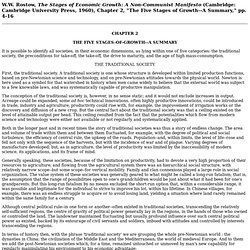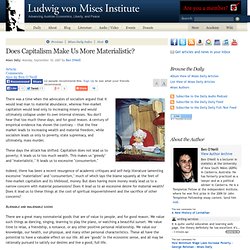

W.W. Rostow, The Stages of Economic Growth: A Non-Communist Manifesto (Cambridge: Cambridge University Press, 1960), Chapter 2, "The Five Stages of Growth. W.W.

Rostow, The Stages of Economic Growth: A Non-Communist Manifesto (Cambridge: Cambridge University Press, 1960), Chapter 2, "The Five Stages of Growth--A Summary," pp. 4-16 It is possible to identify all societies, in their economic dimensions, as lying within one of five categories: the traditional society, the preconditions for take-off, the take-off, the drive to maturity, and the age of high mass-consumption. First, the traditional society. A traditional society is one whose structure is developed within limited production functions, based on pre-Newtonian science and technology, and on pre-Newtonian attitudes towards the physical world. Newton is here used as a symbol for that watershed in history when men came widely to believe that the external world was subject to a few knowable laws, and was systematically capable of productive manipulation.
The conception of the traditional society is, however, in no sense static; and it would not exclude increases in output. The 5 Most Horrifying Things Corporations Are Taking Over. It's true that a part of us dies every time we see Dr.

Dre doing Dr. Pepper commercials, but in reality we've pretty much accepted that "selling out" is a part of life. Everybody needs to get paid, right? But sometimes corporate sellouts involve more than cringe-worthy ads and intrusive product placement. This is when selling out starts to get just a bit horrifying. #5. It's kind of hard to trash talk mercenaries when The A-Team made it clear that next to being an astronaut fireman, there's just about nothing as cool as being a soldier of fortune. GettyGuarding opium harvests. The Sellout: When the U.S. military is stretched too thin, private firms like Blackwater and DynCorp have graciously offered to fill in the gaps.
Since 2000, Blackwater alone has received at least $600 million in contracts from the CIA and over a billion dollars from the federal government. GettyAnd buying wicked cars for their phat cribs. The problem, though, is oversight. Via Qwiki.comAhhhh, good times, guys. . #4. Does Capitalism Make Us More Materialistic? - Ben O'Neill. There was a time when the advocates of socialism argued that it would lead man to material abundance, whereas free-market capitalism would lead only to increasing misery and would ultimately collapse under its own internal stresses.

You don't hear that too much these days, and for good reason. A century of empirical evidence has shown the contrary — that the free market leads to increasing wealth and material freedom, while socialism leads us only to poverty, state supremacy, and ultimately, mass murder. These days the attack has shifted. Capitalism does not lead us to poverty; it leads us to too much wealth. This makes us "greedy" and "materialistic. " Indeed, there has been a recent resurgence of academic critiques and self-help literature lamenting excessive "materialism" and "consumerism," much of which lays the blame squarely at the feet of free-market capitalism and its lifeblood, money. Alienable and inalienable goods Money and alienable goods He further observes that Notes.